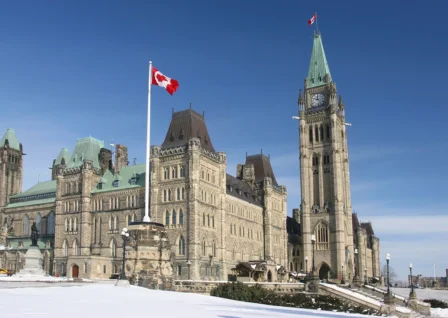Canada Immigration






Canada is a vast and diverse country located in North America. It is the second-largest country in the world by land area. Known for its stunning natural landscapes, including mountains, forests, and lakes, Canada is a haven for outdoor enthusiasts. The country is bilingual, with English and French as its official languages, reflecting its rich cultural heritage.

The Canadian government's goal is to welcome more than 5,00,000 immigrants by 2025. So the government's plan offers new vacancies in various sectors such as IT, Engineering, farming, marketing, programming, and unskilled labor.
Canada has more than one million jobs to apply for. In the first quarter of last year, the number of jobs available in Canada was around 8,90,000, which has increased to 10,35,000. Below, we mentioned some emptiness in different sectors.
|
Industries |
No. of Vacancies |
|---|---|
|
Healthcare |
13,690 |
|
Manufacturing |
9,520 |
|
Retail and Wholesale |
24,340 |
|
Restaurants and food services |
8,500 |
|
Finance |
5,320 |
|
Information Technologies |
4,950 |
|
Construction and maintenance services |
8,060 |
There are four popular ways:
The Canadian government utilizes the Express Entry system to handle permanent residence applications efficiently. This online platform focuses on managing applications for skilled worker immigration. Launched in 2015, it has rapidly gained popularity and emerged as the predominant choice for individuals seeking to immigrate to Canada.

Provincial Nominee Programs (PNPs) are immigration programs in Canada that allow individual provinces and territories to nominate candidates for permanent residency based on their specific economic and labor market needs. These programs are an essential component of Canada's overall immigration strategy, as they enable provinces to address regional demographic and economic challenges.
Business immigration in Canada is a category of immigration programs designed to attract individuals with entrepreneurial skills, business experience, and the ability to contribute to the Canadian economy. The business immigration programs aim to stimulate economic growth, create job opportunities, and foster innovation. There are several pathways within the business immigration category, each catering to different types of business professionals.
Sponsorship in the context of Canadian immigration typically refers to the process where a Canadian citizen or permanent resident (the sponsor) supports the immigration application of a family member or relative to come to Canada as a permanent resident. This is often referred to as Family Class Sponsorship, and it's a way for families to reunite in Canada. Here are key points about sponsorship in Canadian immigration:
You need to meet the following basic eligibility criteria:-

Permanent residency process can take minimum of 6 months. Time majorly depends on the points candidate get on the basis of Age, education, experience, marital status and English/French language ability.
Total expenditure can be calculated based on family size:
In general
Canada: 1.5 to 1.75 Lakh INR (this included 3rd party assessment and exclude affinity fee).
Australia: around 2.5lakh to 3 lakh INR (this included 3rd party assessment and exclude affinity fee).
You can speak with affinity team for more details.
We need documents to prove points of candidate based on Age, education, experience, marital status , English/French language ability, medical ,police clearance certificate and settlement funds.
Permanent residency grants the holder the right to live and work in Canada on a long-term basis, while citizenship gives the holder the right to vote, obtain a Canadian passport, and access certain government services.